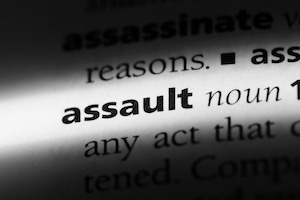FAQs Assault in Charlotte
 Facing an assault charge is a serious matter. Legal representation helps you decipher North Carolina’s intricate criminal laws and sometimes confusing legal terminology. Defense lawyers stand as your advocate, helping protect your legal rights and best interests. An attorney's guidance can change the trajectory of your case, offering insights and strategies that might not be evident to those unfamiliar with the legal landscape. Criminal defense attorneys provide a foundation upon which you can base decisions and actions, offering a clear path in difficult times.
Facing an assault charge is a serious matter. Legal representation helps you decipher North Carolina’s intricate criminal laws and sometimes confusing legal terminology. Defense lawyers stand as your advocate, helping protect your legal rights and best interests. An attorney's guidance can change the trajectory of your case, offering insights and strategies that might not be evident to those unfamiliar with the legal landscape. Criminal defense attorneys provide a foundation upon which you can base decisions and actions, offering a clear path in difficult times.
The moment you sense potential legal trouble or are approached by law enforcement, it's a good idea to consult an attorney. Often, early advice can prevent complications, helping make sure your rights are upheld from the onset. While it might feel instinctual to cooperate fully, giving statements without the guidance and advice of legal counsel can sometimes inadvertently harm your position. Before answering questions or trying to explain your side, always consider seeking an experienced criminal defense attorney. It can make a world of difference.
We believe the best time to hire a lawyer in Charlotte is at the first hint of potential legal troubles, even before formal charges are made. Should law enforcement begin asking questions or if you feel there might be an accusation coming your way, securing representation can be key in developing a comprehensive defense strategy that is tailored to you and your best interests. Talking with the police, attempting to offer apologies, or reaching out to the alleged victim can make a bad situation worse. An attorney can help guide those interactions or advise you about the best way to proceed.
 Assault charges in North Carolina cover different types of cases, from misdemeanor altercations to severe incidents that result in an indictment for felony assault. Understanding your specific charge is key, given the penalties and legal nuances can depend on the nature and circumstances of the allegations. Consequences can range from fines, restitution, and probation to incarceration (jail/prison), with potential long-term implications on personal and professional fronts. Armed with knowledge and a sound strategy, you'll be better prepared to navigate the legal system and develop a defense strategy.
Assault charges in North Carolina cover different types of cases, from misdemeanor altercations to severe incidents that result in an indictment for felony assault. Understanding your specific charge is key, given the penalties and legal nuances can depend on the nature and circumstances of the allegations. Consequences can range from fines, restitution, and probation to incarceration (jail/prison), with potential long-term implications on personal and professional fronts. Armed with knowledge and a sound strategy, you'll be better prepared to navigate the legal system and develop a defense strategy.
Misdemeanor assaults in North Carolina tend to be less severe altercations, often resulting in minor injuries or threats. Felonies, on the other hand, stem from more grievous actions, possibly involving weapons or leading to serious bodily injury or harm. The distinction impacts potential legal repercussions, with felonies carrying heftier penalties, possible prison time, and lasting effects on one's life and reputation.
In North Carolina, Assault on a Female is a distinct misdemeanor charge that involves incidents where a male aged 18 years old or older is alleged to have assaulted a female. Assault on a Female is a serious criminal offense and is designated a Class A1 misdemeanor, the highest level of misdemeanor charge in North Carolina. The maximum possible punishment for Assault on Female in North Carolina is 150 days of Active Punishment (jail/incarceration). A1 misdemeanor charges in NC are treated with heightened seriousness, and convictions can lead to significant penalties, reflecting the intent to protect potential victims and punish the alleged offender.
Assault by Strangulation in North Carolina is a felony criminal charge as defined in N.C.G.S. § 14-32.4. It is a broadly written and purposely inclusive law that covers incidents where the defendant is accused of impeding another's airflow, often by applying pressure to the neck or face. Given the immediate life-threatening implications of such actions, Assault by Strangulation charges are taken very seriously. Any person found guilty of assaulting a victim who has inflicted serious injury by strangulation is guilty of a Class H Felony. Any person found guilty of assaulting another person and who inflicts serious bodily injury is punished as a Class F Felony. Serious Bodily Injuries include permanent disfigurement, substantial risk of death, coma, a protracted or permanent condition that causes pain that is extreme, prolonged hospitalization, or protracted or permanent loss of any bodily organ or member.
 Assault with a Deadly Weapon (AWDW) in North Carolina hinges on two primary elements: the act of assault itself and the incorporation of a deadly weapon during the assault. This doesn't solely pertain to weapons like guns or knives. The definition broadens to include a tool or object capable of causing serious harm or potentially leading to a fatality. When an assault, battery, or affray results in significant injury or involves the use of such a weapon, it is categorized as a Class A1 Misdemeanor in N.C.G.S. § 14-33. This designation carries a potential sentence of up to 150 days of incarceration. The judicial system weighs the specifics of the act alongside the potential and realized harm, tailoring penalties to the severity of each case. Felonious assault with a deadly weapon is defined in N.C.G.S. § 14-32 and may involve assaults with the intent to kill and assaults inflicting serious injury.
Assault with a Deadly Weapon (AWDW) in North Carolina hinges on two primary elements: the act of assault itself and the incorporation of a deadly weapon during the assault. This doesn't solely pertain to weapons like guns or knives. The definition broadens to include a tool or object capable of causing serious harm or potentially leading to a fatality. When an assault, battery, or affray results in significant injury or involves the use of such a weapon, it is categorized as a Class A1 Misdemeanor in N.C.G.S. § 14-33. This designation carries a potential sentence of up to 150 days of incarceration. The judicial system weighs the specifics of the act alongside the potential and realized harm, tailoring penalties to the severity of each case. Felonious assault with a deadly weapon is defined in N.C.G.S. § 14-32 and may involve assaults with the intent to kill and assaults inflicting serious injury.
In North Carolina, bail decisions factor in the nature of the alleged crime, prior legal interactions, and one's ties to the community. A judicial official, such as a magistrate or judge, takes a holistic view, setting an amount that balances the rights of the accused with community safety and the assurance of court appearances. It's a delicate balance, aiming to be fair while upholding the principles of justice. Mecklenburg County, North Carolina, has adopted a Bail Policy that takes into consideration the Due Process Rights of defendants accused of crime. It also seeks to protect witnesses, victims, and the community from interference with the judicial process, danger, or threats.
The outcome of an assault case often hinges on several key factors. The integrity of the evidence presented, the reliability of witness testimonies, and the lawfulness of the arrest and subsequent investigative procedures are crucial. Each case has its own set of unique dynamics and challenges. A detailed review by a seasoned criminal defense attorney in Charlotte NC may uncover avenues for challenging charges, highlighting potential oversights or misinterpretations of the law. These findings could lead to challenging the validity of the charges, possibly resulting in their reduction or, in some instances, a total dismissal as may be legally and/or factually appropriate.
In North Carolina, there's a distinct difference in how the law approaches misdemeanors versus felonies concerning the statute of limitations. For misdemeanors, there is a window from the date of the alleged act in which charges can be brought forward. Once that period passes, the opportunity to prosecute typically expires. However, felonies are treated with enduring gravity. There is no established time limit for filing felony charges, allowing the State (the prosecutor) to bring them forward regardless of when the incident is said to have taken place. This highlights the state's perspective on the lasting significance of felony offenses.
 In North Carolina, self-defense stands recognized as a valid legal defense against assault charges. The state's legal framework acknowledges the right of individuals to protect themselves or others when confronted with a genuine threat. Actions stemming from a sincere belief in the necessity of defense due to an imminent risk can provide a foundation for such a defense. However, it's imperative that defensive measures remain proportionate to the perceived threat. Any use of force deemed excessive or not aligning with the level of danger could undermine a self-defense claim. Given the complexities of this legal area, a comprehensive understanding and a robust defense strategy are essential when presenting self-defense in related cases.
In North Carolina, self-defense stands recognized as a valid legal defense against assault charges. The state's legal framework acknowledges the right of individuals to protect themselves or others when confronted with a genuine threat. Actions stemming from a sincere belief in the necessity of defense due to an imminent risk can provide a foundation for such a defense. However, it's imperative that defensive measures remain proportionate to the perceived threat. Any use of force deemed excessive or not aligning with the level of danger could undermine a self-defense claim. Given the complexities of this legal area, a comprehensive understanding and a robust defense strategy are essential when presenting self-defense in related cases.
 Powers Law Firm PA Home
Powers Law Firm PA Home














